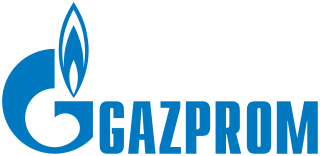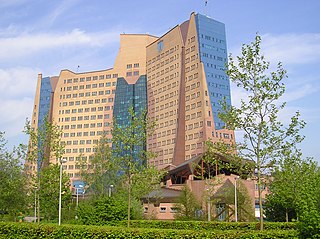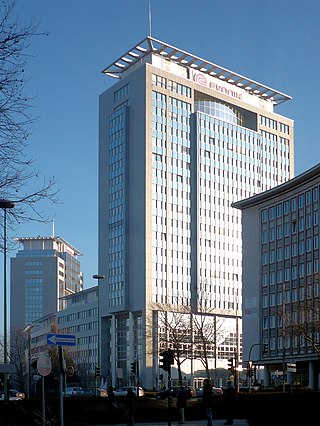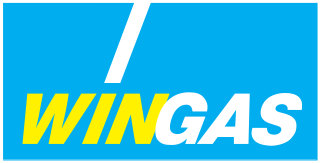
DEA Deutsche Erdoel AG was an international oil and gas company headquartered in Hamburg, Germany. It was a subsidiary of L1 Energy. In 2018, DEA owned stakes in oil and gas licenses in various countries and operated natural gas underground storage facilities in Germany. DEA is a derivation from Deutsche Erdöl-Aktiengesellschaft, the original name of the company. On 1 May 2019, DEA merged with Wintershall to form Wintershall Dea.

PJSC Gazprom is a Russian majority state-owned multinational energy corporation headquartered in the Lakhta Center in Saint Petersburg. As of 2019, with sales over $120 billion, it was ranked as the largest publicly listed natural gas company in the world and the largest company in Russia by revenue. In the 2020 Forbes Global 2000, Gazprom was ranked as the 32nd largest public company in the world. The Gazprom name is a contraction of the Russian words gazovaya promyshlennost. In January 2022, Gazprom displaced Sberbank from the first place in the list of the largest companies in Russia by market capitalization. In 2022, the company's revenue amounted to 8 trillion rubles. In 2023, the company is delisted from international markets, and continues substantial construction in its operational results.

The Federal Network Agency is the German regulatory office for electricity, gas, telecommunications, post and railway markets. It is a federal agency of the Federal Ministry for Economic Affairs and Climate Action and headquartered in Bonn, Germany.
Nord Stream is a pair of offshore natural gas pipelines in Europe that run under the Baltic Sea from Russia to Germany. It comprises the Nord Stream 1 (NS1) pipeline running from Vyborg in northwestern Russia, near Finland, and the Nord Stream 2 (NS2) pipeline running from Ust-Luga in northwestern Russia near Estonia. Both pipelines run to Lubmin in the northeastern German state of Mecklenburg-Vorpommern. Each pipeline comprises two pipes, denoted A and B; each of the four pipes is approximately 1,200 kilometres (750 mi) long and with approximate diameters of 1,220 millimetres (48 in). The combined capacity of the four pipes is 110 billion cubic metres per annum of natural gas.

Nord Stream AG is a consortium for construction and operation of the Nord Stream 1 submarine pipeline between Vyborg in Russia and Greifswald in Germany. The consortium was incorporated in Zug, Switzerland, on 30 November 2005. The original name of company was the North European Gas Pipeline Company. The company was renamed to Nord Stream AG on 4 October 2006.

N.V. Nederlandse Gasunie is a Dutch natural gas infrastructure and transportation company operating in the Netherlands and Germany. Gasunie owns the Netherlands gas transmission network with a total length of over 12,000 kilometres (7,500 mi) and 3,100 kilometres (1,900 mi) long network in Germany.

Wintershall Holding GmbH, based in Kassel, was Germany's largest crude oil and natural gas producer. It was a wholly owned subsidiary of BASF. The company was active in oil and gas exploration and production with operations in Europe, North Africa, South America as well as Russia and the Middle East region. Wintershall employed more than 2,000 people worldwide. In the 2018 financial year the company produced around 171 million barrels of oil equivalent (boe) of oil and gas. Revenues amounted to 4.09 billion euros.

The OPAL (Ostsee-Pipeline-Anbindungsleitung) is a natural gas pipeline in Germany alongside the German eastern border. The OPAL pipeline is one of two projected pipelines connecting the Nord Stream 1 pipeline to the existing pipeline grid in Middle and Western Europe, the other one being the NEL pipeline.
Ruhrgas AG was the largest natural gas transportation and trading company based in Essen, Germany. The company was founded in 1926 and it finally ceased to exist on 2 May 2013 when it was merged into E.ON Global Commodities SE.

Evonik Industries AG is a publicly-listed German specialty chemicals company headquartered in Essen, North Rhine-Westphalia, Germany. It is the second-largest chemicals company in Germany, and one of the largest specialty chemicals companies in the world. It is predominantly owned by the RAG Foundation and was founded on 12 September 2007 as a result of restructuring of the mining and technology group RAG AG.

Wingas GmbH is a gas distribution company located in Kassel, Germany. It is a subsidiary of Gazprom, which held its shares through W&G Beteilligungs-GmbH & Co. KG.

Haidach gas storage is an underground natural gas storage in the town of Haidach near Salzburg, Austria. As of the end of 2018 with a capacity of ~2.9 billion cubic meters (bcm) it is the third largest gas storage facility in Central Europe.
Centrex Europe Energy and Gas AG is "an international group of companies operating in the natural gas sector, focussing on the extraction and marketing of natural gas reserves". It is believed to be a Gazprom front company.
Vemex is a Gazprom-controlled natural gas trading company in the Czech Republic. In addition to the Czech Republic, the company also operates in Slovakia.

Russia supplies a significant volume of fossil fuels to other European countries. In 2021, it was the largest exporter of oil and natural gas to the European Union, (90%) and 40% of gas consumed in the EU came from Russia.
Vienna Capital Partners (VCP) is a corporate finance advisor and private equity investor headquartered in Vienna, Austria.
Nord Stream 2 is a 1,234-kilometre-long (767 mi) natural gas pipeline from Russia to Germany running through the Baltic Sea, financed by Gazprom and several European energy companies. The construction of the pipeline started in 2011, to expand the Nord Stream 1 line and double annual capacity to 110 billion cubic metres. It was completed in September 2021, but has not yet entered service. Planning and construction of the pipeline were mired in political controversy over fears that Russia would use it for geopolitical advantage with Europe and Ukraine.

Wintershall Dea GmbH is a German gas and oil producer. The joint venture was created in May 2019 by the merger between Wintershall Holding GmbH and DEA Deutsche Erdoel AG. BASF SE has a 67% stake in it, with the other 33% being held by LetterOne, whose main ultimate owner is the Russian business magnate Mikhail Fridman. As of 2020 it was planning listing on the Frankfurt Stock Exchange.

The Russia–EU gas dispute flared up in March 2022 following the invasion of Ukraine in late February. Russia and the major EU countries clashed over the issue of payment for pipeline natural gas exported to Europe by Russia's Gazprom. In June, Russia cut the flow of gas to Germany by more than half, and in September of that year it stopped it altogether. On 26 September 2022, the Nord Stream 1 and 2 gas pipelines both ruptured with evidence of sabotage. As of August 2023, Russian pipeline gas exports continued to flow via Ukraine to Slovakia, Austria, and Italy, as well as to non-EU Moldova; via the Turk Stream pipeline, Russian gas continued to flow to Greece, Hungary, and Croatia, as well as a number of non-EU countries in Europe, while Europe imported record volumes of liquefied natural gas from Russia in 2022, with Spain being one of the key importers of Russian LNG.













